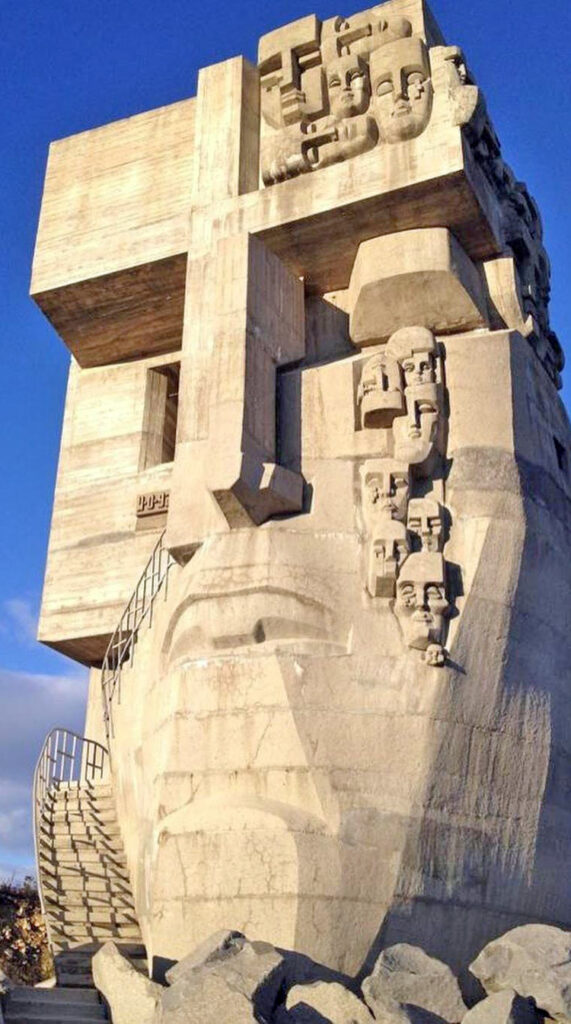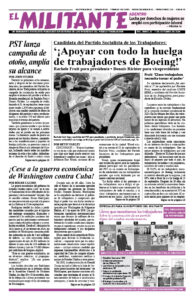Russian President Vladimir Putin’s invasion of Ukraine has faced determined resistance for more than two and a half years as Ukrainian working people there fight to defend their country’s sovereignty. Putin is also waging a war on the home front with tightening police repression, censorship and stepped-up state propaganda to try to deter growing opposition among Russian soldiers, their families and other working people.
The Kremlin is rewriting history to justify its course. Revised high school textbooks now convey Putin’s self-serving narrative glorifying Russia’s “1,000-year” history leading to him being presented as a new czar. An 11th grade textbook now describes his attempted conquest of Ukraine as “the return of our historical lands.”
Putin, a former KGB political-police officer, now wants to erase the memory of the anti-working-class crimes of Joseph Stalin. He claims both he and Stalin are great wartime leaders in the fight against “Nazism.”
In reality, the German imperialist invasion of the Soviet Union in World War II was defeated by millions of workers and peasants who fought to defend their workers state in spite of, not because of, Stalin’s brutal regime. Fearing opposition, Stalin had killed or imprisoned the Soviet military leadership on the eve of the war.
Putin is now moving to overturn the “rehabilitation” of victims of Stalin’s Great Terror. Three-quarters of a million people were killed with a million more imprisoned in Gulag forced-labor camps starting in the 1930s.
Lenin’s revolution reversed by Stalin
These bloody purges were the culmination of a bureaucratic counterrevolution headed by Stalin against the proletarian internationalist course of Bolshevik leader V.I. Lenin that had marked the early years of the Russian Revolution.

Lenin is hated by Putin, both for his overthrow of the czarist regime and for defending national self-determination for Ukrainians, Georgians and other oppressed nationalities under the czarist prison house of nations.
Lenin’s final political struggle was against bureaucratic encroachments on working-class control of the new state and to try to safeguard the voluntary character of the union of the Soviet republics. After Lenin’s death, thousands of revolutionary militants were among those executed, imprisoned or exiled in Stalin’s purges of the 1930s. Leon Trotsky led those committed to uphold Lenin’s course against the consolidation of the counterrevolutionary bureaucracy under Stalin.
Under growing pressure from both inside and outside of Russia, a “thaw” in repression was carried out by Stalin’s successor, Soviet Premier Nikita Khrushchev, and later by Mikhail Gorbachev. These regimes released thousands of prisoners and thousands more were proclaimed rehabilitated posthumously.
After the disintegration of the Soviet Union at the end of the 1980s, rehabilitations accelerated. Under a sweeping 1991 law, over 3 million people had their names belatedly cleared of Stalin’s frame-up charges.
Now Putin wants to begin reversing those measures. These moves follow Putin’s 2021 banning of Memorial, the Russian rights organization that documented Soviet-era crimes. A new draft law aims to overturn rehabilitations as part of “defending society from destructive info-psychological influence.”
Putin revives Soviet-era denunciation
Putin earlier had tried to disassociate himself from Stalin’s legacy. “Stalinism is associated with a personality cult and mass violations of the law, with repression and camps,” he said in 2013. “There is nothing like this in Russia and, I hope, never will be again.” But now he has presided over the construction of a new Gulag.
“The level of repression and of terror increased enormously” in the occupied areas, including Crimea, after Putin’s full-scale invasion of Ukraine, Halya Coynash wrote in the Sept. 20 Kharkiv Human Rights Protection Group newsletter.
Now Putin’s regime “has systematically reinstated Soviet-era denunciations in the Russian Federation and is trying to do the same in occupied parts of Ukraine,” she wrote. As part of the “general warmongering hysteria,” she noted, the rationale is the need “to fight ‘extremism,’ a concept as broad and elastic as ‘spies’ and ‘traitors’ during the years of Soviet Terror.”
And Moscow is moving to “reinstate another foul feature of the Soviet regime, namely the notorious Stalin-era SMERSH ‘counterintelligence’ units.” These secret forces, she noted, “will be used as an additional weapon of terror directed against Ukrainian resistance and Ukrainian identity.”
The memory of Stalin’s crimes runs deep among millions of families across the former Soviet Union whose relatives became victims. Now the growing opposition to Moscow’s war and the Kremlin’s bloody repression threaten Putin’s regime.

